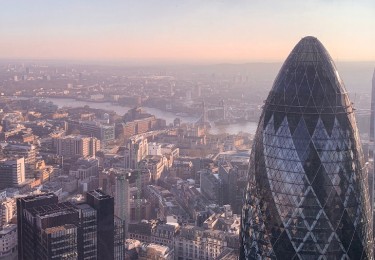Become a client
When you become a client of Coutts, you will be part of an exclusive networkCoutts has partnered with The Financial Times Wealth Channel to support coverage of the most important topics, trends and news for today’s high-net worth individuals. Here we share an exclusive article on how clients have the potential to demand more from banks and other providers of less tangible services.
Towards the end of last year, as the world prepared for the United Nations’ COP26 climate change conference in Glasgow, a slew of companies signed up to the Climate Pledge, an initiative backed by online retailer Amazon, to commit to net zero carbon emissions by 2040.
The list of new signatories, which included healthcare giant GSK, the telecommunications company BT Group, and HP, the US technology hardware producer, highlights the extent to which global brands are going green, driven by so-called “eco actives”, a new breed of sustainably minded consumer that now comprises 22 per cent of all shoppers, according to research by Kantar, the brand consultancy.
But while it is increasingly common for consumers to think twice before buying single-use plastic or to shun products with a high carbon footprint, their choices are often less discerning when it comes to services, such as banking, insurance and asset management.
“As human beings, it’s much easier for us to evaluate a physical product,” says Leslie Gent, Managing Director, Head of Responsible Investing at Coutts, the private bank. “Less tangible products and services are not nearly as straightforward.”
Gent argues that these types of services are where consumers, in particular high net worth individuals (HNWIs), who wield considerable financial clout, have a potentially critical role to play in ensuring that companies and firms accelerate and deepen their commitments to environmental, social and governance (ESG) factors.
One area in which HNWIs and eco actives have already exerted their influence to further sustainability is in the luxury sector, where they have demanded greater transparency from brands around the origin of goods, better performance in boardrooms, on shopfloors and down the supply chain on issues of gender and culture, corporate citizenship and environmental responsibility.
Chloé, a luxury fashion brand, is one of many leading companies that have put sustainability at the centre of their operations. The soles of Lou, Chloé’s new footwear line, are made with Ocean Sole, a social enterprise that upcycles flip-flops washed up on Kenya’s beaches.
In October, Chloé became one of the first luxury houses to become a B Corporation company, demonstrating its pursuit of purpose, as well as profit. “B Corps” are certified as meeting exacting standards of verified social and environmental performance, public transparency and legal accountability. “We have decided to transform our operations and shift our mindset through efforts in everyday practices,” said a statement from Chloé at the time.
Among other objectives, Chloé has set multiple short-term targets, with goals to reduce water consumption by 10 per cent this year, compared with 2019, and to reduce scope 1, 2 and 3 greenhouse gas emissions – direct, indirect and those produced up and down a company’s entire value chain – by 15 per cent this year, compared with three years ago.
While there’s clearly a growing consumer base for sustainable fashion, those who seek and use less tangible services, particularly private clients, may struggle to find something as quantitative when it comes to sustainability and ESG criteria. That places the onus on companies to begin the discussion themselves.
Alan Thomas, CEO of Simply Business, a UK small business insurance provider that attained B Corp status in 2017, says the decision to establish sustainability as part of its core mission came from within the company, rather than from customer demands. “It wasn’t what clients were demanding – we just knew it was the right thing to do,” he says.
Thomas, whose company now has a social impact committee as part of its governance structure, and actively supports several UK charities, says that having environmental credentials has become a badge of honour, sparking interest both at industry and client level. “It has helped us show people what can be done, and it shows that there is a different way of approaching things,” he says. “It has started a conversation.”
Banks, insurance companies and asset managers, among others, oil the wheels of the global economy, effectively deciding which companies receive financing for investment and growth, and which corporations get the insurance cover they need to operate.
We are now seeing the power of clients to begin, and join, sustainability conversations. According to a report by PwC, the asset and wealth management industry alone now has $110tn under management, an increase of 40 per cent in just the past five years; as of March 2022, the Net Zero Asset Managers Initiative claims that more than half of that, $57.5tn, is invested in being carbon neutral by 2050 or sooner.
Gent of Coutts argues that companies providing less tangible products should encourage clients to engage more, and to start asking questions about sustainability, by adopting and communicating measurable ESG targets that are easy to understand. “They need to translate numbers into things that make sense,” she says. “Ultimately, it’s about breaking down the complexity and making less tangible products and services more tangible.”
More insights








